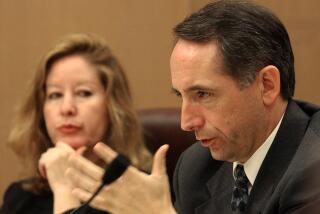George Dunn, 71; Judge Called Pratt Trial Unfair
- Share via
George William Dunn, the judge who wrote a controversial appellate opinion in which he said Black Panther Elmer “Geronimo” Pratt had not received a fair trial in his murder case, has died. He was 71.
Dunn, a retired Long Beach Municipal Court judge who wrote his dissenting opinion in the Pratt case while on temporary assignment to the state Court of Appeal, died Wednesday in a Long Beach convalescent hospital of complications from a stroke he suffered about five months ago.
Dunn, who was elected to the Municipal Court in 1978, spent much of the next two decades on assignment to the Superior Court and the Court of Appeal, where 60 of his opinions and dissents were published. That is considered a relatively high number for a trial judge on temporary appellate assignment.
His most controversial dissent came in 1980, while he was assigned to the Court of Appeal to hear Pratt’s first habeas corpus review. Pratt had been convicted eight years earlier of killing schoolteacher Carolyn Olsen in a 1968 robbery on a Santa Monica tennis court and had been sentenced to 25 years to life in prison.
Pratt, the two-justice majority believed, was not entitled to a hearing on the grounds that the pivotal witness against him had been a secret informant who received money to buy a gun and got a plea-bargain deal in return for his testimony.
But Dunn dissented, asserting that Pratt had not received a fair trial.
In his opinion, Dunn, the only African American on the panel, wrote in part: “A trial which is not fundamentally fair is no trial at all. It is a non sequitur to argue that a defendant is obviously guilty if it is an established fact that the defendant was not afforded a fair trail. . . .”
But the majority strongly disagreed with Dunn, writing: “The dissenting opinion has bought hook, line and sinker [the] defendant’s arguments in his petition, which, when dissected and analyzed, have as little substance as a handful of fog. . . .”
In 1997, Pratt was freed from prison after an Orange County Municipal Court judge reversed the quarter-century-old murder conviction, ruling that Los Angeles County prosecutors had suppressed material evidence that could have led the trial jury to reach a different verdict.
“I think his opinion has been vindicated,” said Dunn’s brother, Reginald, a Los Angeles Superior Court judge, who believes that his brother’s controversial dissenting opinion had professional repercussions for him.
“It made it clear he’d never get an appointment to Superior Court,” Dunn said. “That’s my opinion and the opinion of many others, that his integrity cost him.”
But his brother didn’t dwell on it, Reginald Dunn said. “He just did his job, and he understood there are sometimes ramifications you don’t like.”
Born in New York City in 1930, George Dunn grew up in the Bronx. His parents divorced when he was young, and he and his brother were raised by their mother, a cook for well-to-do families.
At age 10, Dunn began working in a grocery store before and after school. It was the first of many jobs he had while in school, including working as a tailor, a waiter and a carpet cleaner.
“My dad was very self-motivated, and my grandmother let him do what he wanted to do,” said Dunn’s daughter, Leslie. “She realized he was a young man and had many lofty dreams.”
That included going to college. To earn money for his education, he worked as a bellhop at a hotel in West Virginia and as a railroad dining car waiter.
Dunn received a bachelor’s degree in science and history in 1956 and a master’s degree in French history in 1958, both from Ohio State University. After moving to Los Angeles in the late 1950s, he taught science at a junior high school in Pacoima for a decade, also earning his law degree from USC in 1965.
After working for the Long Beach Legal Aid Foundation for a year, Dunn was in private law practice in Long Beach from 1967 to 1979. He also taught business law at Cal State Long Beach in the 1970s.
Dunn retired from the bench in 1999.
In addition to his brother and daughter, he is survived by his wife, Kristin; two sons, Gregory Dunn of Long Beach and Keith Garnett of Columbus, Ohio; another daughter, Nicole Speights of Tustin; and two grandchildren.
‘A trial which is not fundamentally fair is no trial at all.’
More to Read
Sign up for Essential California
The most important California stories and recommendations in your inbox every morning.
You may occasionally receive promotional content from the Los Angeles Times.










